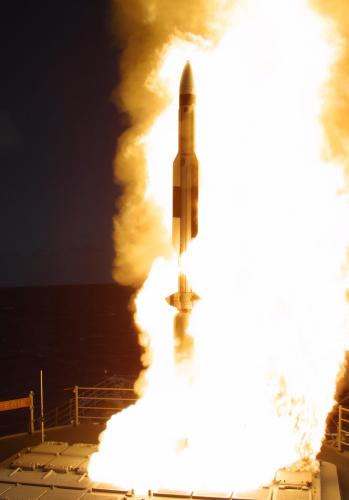North Korea launches volley of missiles on US holiday05 July 2006 0806 hrs (SST) 0006 hrs (GMT)
TOKYO : North Korea test-fired six missiles on Wednesday, including a long-range Taepodong-2 capable of reaching US soil, sparking furious condemnation from neighboring Japan and the United States.
US officials in Washington said Pyongyang launched five short- or medium-range missiles, which splashed down in the Sea of Japan, and a Taepodong-2 that apparently failed less than a minute after liftoff.
The South Korean news agency Yonhap reported 10 launches, but there was no official confirmation.
Urgent consultations were underway at the United Nations in New York following the tests, which coincided with the US Independence Day holiday and a US space shuttle launch. Washington announced it was dispatching a senior official to the region.
South Korea called an emergency cabinet meeting following the tests by its communist neighbor while Japan denounced the launches as a "grave problem" and said it was considering economic sanctions against North Korea.
The White House condemned the tests as "provocative behaviour" and a violation of a seven-year-old missile launch moratorium but said they did not pose an immediate threat to the United States.
In Tokyo, Japanese Chief Cabinet Secretary Shinzo Abe told reporters the missiles landed in the Sea of Japan, several hundred kilometers (miles) from the coast of Japan.
Abe, the government's top spokesman, said Pyongyang had defied the international community. "Today's launches were done despite advance warning by the relevant countries," he said.
"This is a grave problem in terms of peace and stability not only of Japan but also of international society. We strongly protest against North Korea."
"Japan will take stern measures against North Korea," he added.
"Cooperating with the United States, we will work for the UN Security Council to take appropriate measures.
"Japan will take any kind of sanctions we can take."
In Washington, the White House denounced the launches as "provocative" and the Taepodong-2 firing as a violation of a unilateral North Korean pledge made in 1999 to forego long-range tests.
"We do consider it provocative behavior," US national security advisor Stephen Hadley told reporters.
Hadley said the Taepodong-2 did not pose a danger to the United States because "a missile that fails after 40 seconds is not a threat."
The US missile defense system based in California, Alaska and onboard US Navy ships had been on high alert in anticipation of the Taepodong-2 test and ready to shoot any missile down if it threatened US territory.
But since it failed at an early stage, "no action was taken," said a US defense official.
A senior US official said the United States was sending its envoy to the six-nation North Korean nuclear talks, Assistant Secretary of State Christopher Hill, to Asia on Wednesday to discuss the situation.
At the United Nations, US Ambassador John Bolton held urgent talks with his foreign counterparts, but no formal meeting of the UN Security Council was immediately scheduled.
Japan is particularly sensitive to missile tests by North Korea, which in 1998 fired a Taepodong-1 missile over Japan into the Pacific, prompting Tokyo and Washington to step up cooperation to build missile defenses.
The North Korean missile launches came as millions of Americans celebrated Independence Day and minutes after the US space shuttle Discovery roared into space from Cape Canaveral, Florida.
US President George W. Bush was at the White House celebrating his 60th birthday two days early with a group of friends after making a stay-the-course speech on Iraq earlier in the day at a military base in North Carolina.
Bush stayed out of sight but discussed the volatile situation with Secretary of State Condoleezza Rice, Defense Secretary Donald Rumsfeld, and Hadley, the White House said.
US envoy Hill warned last week that a long-range missile launch by North Korea could derail the six-party talks over Pyongyang's nuclear program.
He said that a missile test would have "the opposite effect" and actually compromise rather than strengthen the regime's security.
Preparations for the launch of a multi-stage Taepodong-2 with a range of up to 6,700 kilometers (4,200 miles) had been underway for several weeks at Musudanri on the remote northeast coast of North Korea. - AFP /dt
http://www.channelnewsasia.com/palmnews/asiapacific/view/217257/1/.html


